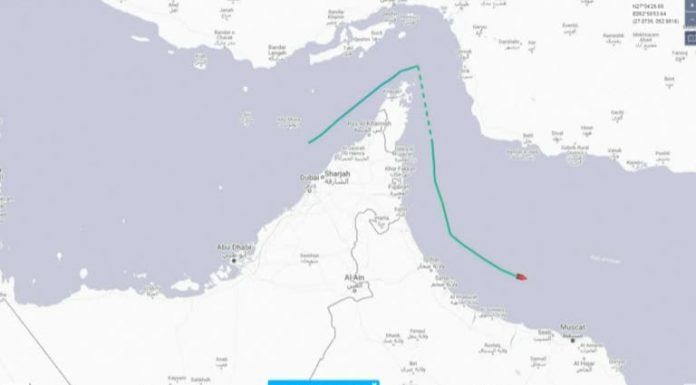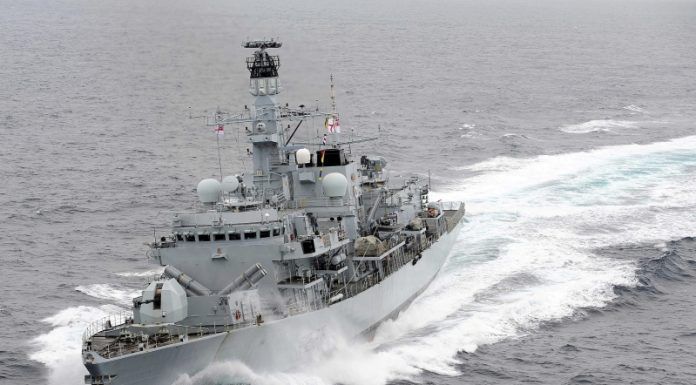By William Schomberg
LONDON, July 11 (Reuters) – Three Iranian vessels tried to block a British-owned tanker passing through the strait that controls the flow of Middle East oil to the world, but backed off when confronted by a Royal Navy warship, Britain said on Thursday.
A week after Britain seized an Iranian tanker accused of violating sanctions on Syria, London said the British Heritage, operated by oil company BP, had been approached in the Strait of Hormuz between Iran and the Arabian peninsula.
“HMS Montrose was forced to position herself between the Iranian vessels and British Heritage and issue verbal warnings to the Iranian vessels, which then turned away,” a British government spokesman said in a statement. It urged Iran to “de-escalate the situation in the region”.
Iran‘s Foreign Minister Mohammad Javad Zarif dismissed as “worthless” the allegation that Iran sought to block the ship.
The United States blames Iran for a series of attacks on shipping in the world’s most important oil artery since mid-May, accusations Tehran rejects. The foes came as close as ever to direct military conflict last month, when Iran shot down a U.S. drone and Trump ordered retaliatory air strikes, only to call them off minutes before impact.
Britain stepped forcefully into the crisis when its Royal Marines seized the Iranian tanker Grace 1 off the coast of Gibraltar last week. Iranian officials have since been quoted as suggesting Iran might retaliate against British shipping.
A British security source said London had already raised its threat warning level for British ships in Iranian waters to the highest possible category earlier this week, although it did not plan to escort every British-flagged vessel through the strait.
Britain would defend its maritime interests but was not trying to escalate the situation with Iran, the source said.
Police in the British territory Gibraltar said on Thursday they had arrested the captain and chief officer of the detained Iranian Grace 1 supertanker accused of violating EU sanctions on Syria and seized documents and electronic devices from the ship.
“I’d expect the Iranians to continue to seek opportunities to harass and obstruct without sliding into war,” said Jon Alterman director of the Middle East Program at the Center for Strategic and International Studies think tank.
The United States quit an agreement last year between Iran and world powers to curb Iran‘s nuclear programme in return for granting it access to world trade. Washington sharply tightened sanctions against Iran since May with the aim of bringing its oil exports to zero. Iran responded by stepping up production of enriched uranium beyond limits in the nuclear deal.
Britain’s seizure of the Iranian ship last week changed the diplomatic calculus after weeks in which Washington’s European allies have strained to appear neutral. They disagreed with Trump’s decision to quit the nuclear pact last year.
Although EU states have not followed Washington in imposing sanctions on Iran, they have sanctions in place that forbid selling oil to Iran‘s ally Syria.
A senior Iranian military commander on Thursday said Britain and the United States would regret detaining the vessel.
A spokesman for the U.S. military’s Central Command said threats to navigation require an international solution: “The world economy depends on the free flow of commerce, and it is incumbent on all nations to protect and preserve this lynchpin of global prosperity,” said Captain Bill Urban.
KEY SHIPPING LANE
U.S. sanctions have effectively driven Iran from mainstream oil markets, depriving it of its main source of revenue and of the benefits it was meant to receive from its nuclear deal.Iran says it will return to full compliance with the agreement only if sanctions are lifted and Washington rejoins the pact.
BP CEO Bob Dudley, asked about the situation in the Gulf at an event at London’s Chatham House on Wednesday evening, said: “We’ve got to be super careful about our ships”.
Ship tracking information from data firm Refinitiv shows four other UK registered tankers now in the Gulf.
Bob Sanguinetti, chief executive with the UK Chamber of Shipping trade association, told Reuters the situation was tense and called for a de-escalation.
“UK shipowners are in regular contact with the relevant authorities and agencies regarding the security situation in the region, and we are confident that the RN (Royal Navy) will provide the necessary support to their vessels,” he said.
The United States is hoping to enlist allies in a military coalition to safeguard strategic waters off Iran and Yemen, Marine General Joseph Dunford, the chairman of the Joint Chiefs of Staff, said on Tuesday.
(Additional reporting by Babak Dehghanpisheh in Geneva, Jonathan Saul in London, Sylvia Westall and Aziz El-Yaakoubi in Dubai; Roberta Rampton in Washington, Costas Pitas and Michael Holden in London; Writing by Michael Georgy; Editing by Jon Boyle and Peter Graff)



